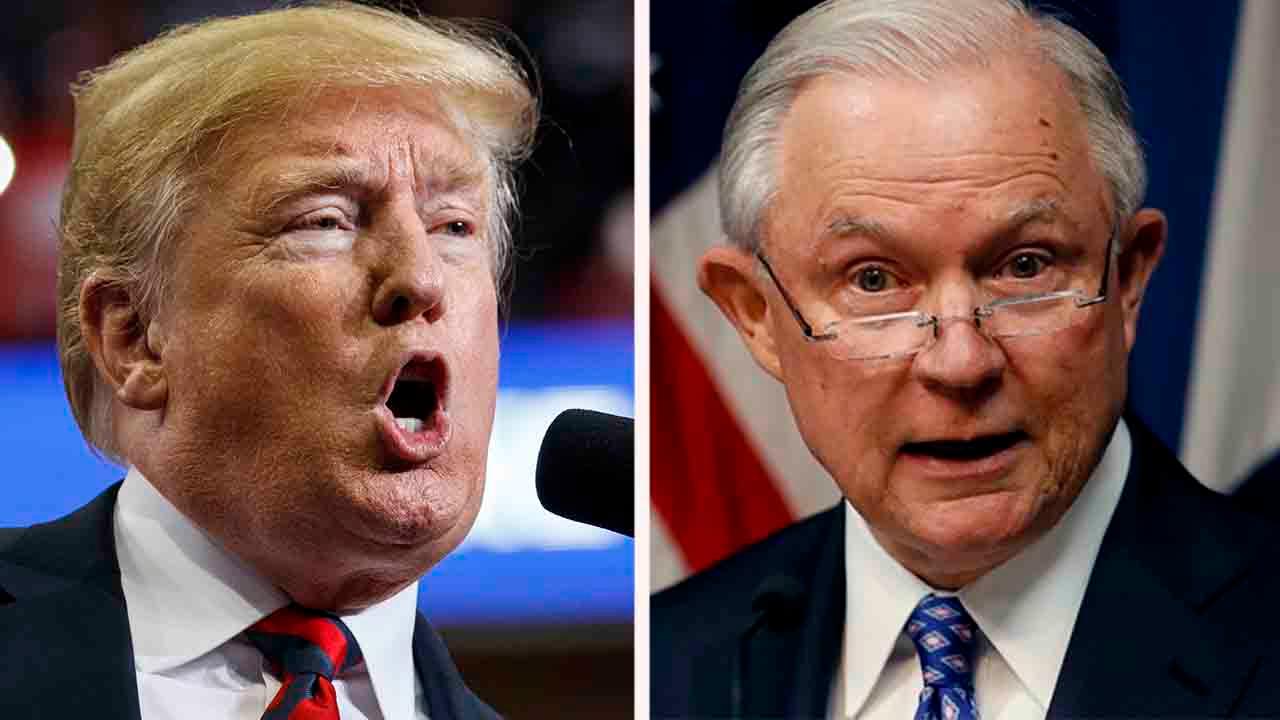Jeff Sessions, once one of President Trump’s most loyal and trusted advisers before infuriating Trump over his recusal from the Russia investigation, has resigned as attorney general at the request of the president.
“At your request, I am submitting my resignation,” Sessions wrote in the Wednesday letter to Trump.
The president tweeted that Matthew Whitaker, who currently serves as chief of staff to Sessions, will become the acting attorney general.
“We are pleased to announce that Matthew G. Whitaker, Chief of Staff to Attorney General Jeff Sessions at the Department of Justice, will become our new Acting Attorney General of the United States. He will serve our Country well,” he said.
Trump added: “We thank Attorney General Jeff Sessions for his service, and wish him well! A permanent replacement will be nominated at a later date.”

Sources told Fox News that Trump did not call Sessions, but rather White House Chief of Staff John Kelly informed him of the president’s request for him to resign. Sessions is expected to leave the Justice Department by the end of the day and Whitaker is expected to be sworn in Wednesday.
In his resignation letter, Sessions said was “honored to serve” as attorney general and said his Justice Department “restored and upheld the rule of law – a glorious tradition that each of us has a responsibility to safeguard.”
Sessions’ departure from the Justice Department is not unexpected, as the president has signaled changes to his administration after the midterms. But no one faced more rumors of an imminent dismissal than Sessions.
For more than a year, Trump has repeatedly lambasted Sessions over his recusal, saying he wouldn’t have installed Sessions as the country’s top law enforcement officer had he known his attorney general would recuse himself from the Russia probe.
In September, Trump said of his strained relationship with Sessions, “I don’t have an attorney general. It’s very sad.”
Shortly after taking office, Sessions removed himself from the Russia investigation in March of 2017, citing his involvement as a high-profile surrogate and adviser to Trump’s campaign.
The investigation into the Russian government’s attempted meddling in the election has hung over the president since he took office. Trump and his aides have denied any collusion with the Russians.
Sources told Fox News Whitaker will now be overseeing the Russia investigation. However, Justice Department ethics officials have not yet determined whether Whitaker will be able to hold that responsibility, or whether he may also eventually have to recuse himself from the investigation.
It’s unclear if Special Counsel Robert Mueller was informed before the announcement.
In March 2017, Sessions announced his plans to recuse himself after reports surfaced detailing undisclosed conversations with Russian ambassador Sergey Kislyak during the campaign. Sessions has said he was acting in his capacity as a Republican senator from Alabama.
At the time of his recusal, Sessions said he met with the “relevant senior career department officials” to discuss the issue.
“Having concluded those meetings today, I have decided to recuse myself from any existing or future investigations of any matters related in any way to the campaigns for president of the United States,” Sessions said.
Deputy Attorney General Rod Rosenstein then took control of the investigation and decided to appoint Mueller to take over the probe.
Trump’s falling out with Sessions was remarkable, considering the pivotal and trusted role the Alabama Republican played for Trump during the campaign.
Sessions — who bonded with Trump over their populist views on trade and immigration — became the first sitting senator to endorse Trump in February 2016 when he announced his support of the New York businessman’s then-underdog campaign.
The endorsement was seen as a blow to Texas Sen. Ted Cruz, Trump’s conservative rival in the Republican race whose path to victory included a strong performance in Southern states. Trump won Alabama.
Sessions went on to become one of Trump’s most outspoken and prominent surrogates during the campaign. A number of Sessions’ top staffers – including Rick Dearborn and Stephen Miller – took senior White House roles. When other Republicans abandoned Trump after the release of the “Access Hollywood” tape just days before the general election, Sessions stood by Trump.
After Trump won the White House, Sessions, who faced no opposition in his 2014 re-election to the Senate, gave up a safe seat to become Trump’s attorney general.
During his confirmation hearing, Sessions denied accusations from Democrats that he had made racially insensitive statements in the past. Though most Democrats voted against their former colleague, his confirmation was seen as redemption for Sessions, whose nomination for a 1986 federal judgeship was rejected by the Senate Judiciary Committee at the time.
As attorney general, Sessions cracked down on illegal immigration, vowing to enforce federal law.
Sessions’ former Senate colleagues on Wednesday praised him for his service.
“As our country’s top law enforcement official, he has been integral in fighting the opioid epidemic, keeping violent criminals off our streets, and supporting victims,” Texas Republican Sen. John Cornyn said in a statement. “Those who know him understand his commitment to the rule of law, and his deep and abiding concern for our country.”
But Sessions also had his critics.
“Jeff Sessions was the worst attorney general in modern American history,” American Civil Liberties Union executive director Anthony D. Romero said.




Leave a Reply